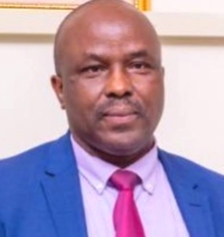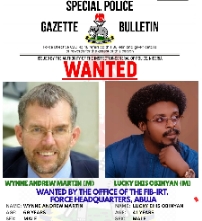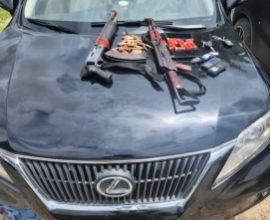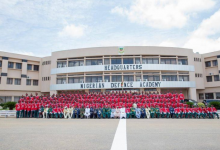
By providence, 34 years ago, Dr Wilson Esangbedo found himself in the security business and he seized the opportunity to inject fresh ideas into the business which has become one of the fastest growing businesses in Nigeria.
The fresh ideas have transformed into great assets which have been providing job opportunities for the teeming population of Nigeria youths.
His hard work has brought him to limelight and he is the former Lagos State Chairman of the Association of Licensed Private Security Practitioners of Nigeria (ALPSPN) and the immediate past National president of the association.
Esangbedo is Executive Secretary of Nigerian lnstitute for industrial security.
Recently, National Association of Online Security News Publishers (NAOSNP), paid him a courtesy visit and presented an Award of Credence to him at his Lagos office in Anthony Village, Lagos, where he shared his view about security business in Nigeria and other sundry issues.
Bose Adelaja brings excerpts from the interview.
Can you please introduce yourself
I am from Edo State and a lawyer by profession. I found myself in the security business when I was staying with my elder sister whose husband was doing well in the business. Though I have a chamber, I have contributed my quota to the private security guards industry in Nigeria.
I have been part of the security industry, so I understand the problems and the challenges facing it.
What is your assessment of security situation in Nigeria?
As regards the Association of Licensed Private Security Practitioners of Nigeria, (ALPSPN), the regulators are trying their best but the practitioners need to do more. So far, the association has maintained a cordial relationship with the regulators but so many issues have come up in the guarding business which we have been trashing. For instance, many people are fond of employing ‘maiguards’ but when they misbehave, people easily ascribe such behaviours to licensed guards. However, we have been trying our best to handle the issue professionally.
An example occurred in Port Harcourt where a ‘Mai guard’ killed a person that took him to court probably to prevent her from testifying against him.
This is a lesson to many of us to know how to manage people at that level because they can run after us at any time because what means nothing to you may mean a lot to them.
Recently, President Muhammadu Buhari apologised to Nigerians over some of his misdeeds. How will you react to this ?
When somebody has been a president for eight years and he is asking for forgiveness in the areas where he feels he did not do well, the question is; did he do well?
Some of his policies did not help anybody, an example is the cashless policy which has shut down many small scale businesses and inflicted pains on many Nigerians.
I know many market men and women whose businesses collapsed as a result of the policy.
The person I buy fish from said the business is a cash and carry type, how do we want such a person to survive? Despite my position, sometimes I will be driving without a penny on me, what if anything happens on the road that requires cash?
I read a story about heaps of rotten plantains on the internet, this is another type of cash and carry business we are talking about. That is a major challenge of the cashless policy.
I am sure he tried his best but whether his best is good enough is a question begging for an answer. Anyway, he has begged for forgiveness. I just pray that the incoming president will earnestly look into the problems and select a good team to work with because that is what Jonathan did.
What is your advice to the incoming regime?
Recently, I read some online publications which said that those the incoming government intends to work with, are from a particular region,
What I am saying in essence is that the incoming president should adopt inclusiveness if he wants to have a successful administration.
He should give various zones an opportunity to be part of his government.
What is your advice to the incoming government as regards the issue of insecurity?
The incoming government will never do well if it keeps on relegating private security to the background because this is part of the challenges facing the nation.
Go to other parts of the world like South Africa, Rwanda, the United Kingdom and other advanced countries and you will see the beauty of private guards. When you go to stalls, look at those involved in movement of money from one place to another (escorts), they are private guards and they are allowed to carry arms.
What are we doing here in Nigeria, though there are some unprofessional guards that carry arms and mistakenly misfire to kill their principal, we must guide against this.
The framework must be good and we must have it at the back of our minds that not everybody should be allowed to carry arms. Carrying of arms should be for trained hands,
The type of arms to be carried should be spelt out and the arms carrier should be trained on how to relate with members of the public because once somebody is angry and carrying arms, it will be dangerous and under no circumstance should you use arms to defend yourself unjustly.
There are penalties for this type of action. I said earlier that the framework must be in place.
You have raised some misbehaviors of some ‘maiguards’ , is there a programme in place to train your members?
Plans to train our members are in place, my tenure ended in November 2022. Within six months of my assumption in office, we started pushing the Bill that would allow us to carry arms and after a year, the draft Bill was ready and we told ourselves that we needed to develop the framework. However, nothing happened to the Bill till my last one year in office.
My concern is that if the Bill continues in its present form, it may not see the light of the day.
It was agreed that we should suspend further plans until the incoming regime resumes work.
We are sure that once the Bill gets to the National Assembly, we will talk about the framework and those we have already approached to work on the framework will do their job.
The Bill is not our Bill as an association but it is being pushed by our regulators, so whatever we are going to do will be passed to them.
Some security agencies may not want us to carry arms, the Nigeria Civil Aviation Authority and Federal Road Safety Corps (FRSC) had been given an approval to carry arms but they have not been carrying it for some reasons.
What about renumenration of private guards
This has improved from what I knew. For instance, there are guards earning monthly salaries of N150, 000 depending on the contract. However, it is still an industry where guards are not well paid. While I was president, we inaugurated an advisory group to advise us on what the minimum wage should be but they told us that this was difficult to determine because there are some state governments that are interested in doing business with us but they don’t pay more than N20,000.
Should we peg the minimum wage at N30,000, what will happen to those states ?
That means our business will likely collapse in those states.
They advised that every state should agree on its minimum wage and this is what we are pushing out.
Personally, if people request for my service, the minimum wages I push for a guard is N40,000.
Is there a regulation about working hours?
Something that gives me a serious concern is for a guard to work for Company A, at day time and earns N40,000, instead of him going to sleep, he works at night for Company B and gets N40,000 which is approximately N80,000 because he wants to survive.
One thing is somebody who does not observe rest for a week tends to sleep at work because the body is stressed up. This is a serious challenge that must be taken care of.
During my regime, we came up with consensus to indicate the number of working hours for our members and this revealed an estimated number. I also tried to prevent a situation where a guard will be working for two different companies and for this not to happen, we agreed we must ensure that guards are well paid because N40,000 can no longer feed a family.
To surmount this, we ensure that guards leave close to their places of employment to reduce fares.
What can you say about regulations guiding the private security business?
When I was Chairman in Lagos State, we worked with our regulators and came up with 2018 regulations which state that as a practitioner, once your clients pay you, you must pay your guards. There were instances when company owners ran abroad as soon as they received money from their clients but we kicked against this.
Another important thing we have looked into is insurance for private security guards especially in terms of health and death.
As a body, I know there is a lot of ground to cover, the present regime of ALPSPN is making a case that guards should earn nothing less than N40,000 but this is still in process.
We have been encouraging business owners that if you want to do well in business, you must pay your guards well.
When I was the national president of the association, there was a time we travelled to Kano State and we met a private guards’ operator who worked with a federal government agency and was not paid for two years, that was about N200m, he mortgaged his houses to ensure his guards were paid. At the end of the day, the agency did not pay. We are trying to discourage this and have told regulators to pull out of contracts that are not yielding results. We have also encouraged operators to share such experiences among colleagues so that they don’t fall victims.






